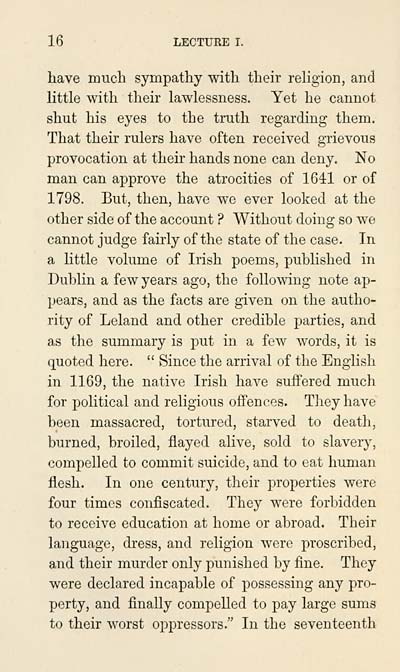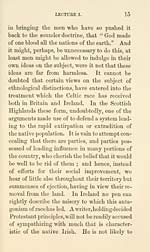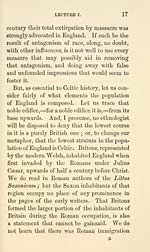Blair Collection > Celtic gleanings, or, Notices of the history and literature of the Scottish Gael
(28)
Download files
Complete book:
Individual page:
Thumbnail gallery: Grid view | List view

16 LECTURE I.
have much sympathy with their religion, and
little with their lawlessness. Yet he cannot
shut his eyes to the truth regarding them.
That their rulers have often received grievous
provocation at their hands none can deny. No
man can approve the atrocities of 1641 or of
1798. But, then, have w^e ever looked at the
other side of the account ? Without doing so we
cannot judge fairly of the state of the case. In
a little volume of Irish poems, published in
Dublin a few years ago, the following note ap-
pears, and as the facts are given on the autho-
rity of Leland and other credible parties, and
as the summary is put in a few words, it is
quoted here. " Since the arrival of the English
in 1169, the native Irish have suffered much
for political and religious offences. They have
been massacred, tortured, starved to death,
burned, broiled, flayed alive, sold to slavery,
compelled to commit suicide, and to eat human
flesh. In one century, their properties were
four times confiscated. They were forbidden
to receive education at home or abroad. Their
language, dress, and religion were proscribed,
and their murder only punished by fine. They
were declared incapable of possessing any pro-
perty, and finally compelled to pay large sums
to their worst oppressors." In the seventeenth
have much sympathy with their religion, and
little with their lawlessness. Yet he cannot
shut his eyes to the truth regarding them.
That their rulers have often received grievous
provocation at their hands none can deny. No
man can approve the atrocities of 1641 or of
1798. But, then, have w^e ever looked at the
other side of the account ? Without doing so we
cannot judge fairly of the state of the case. In
a little volume of Irish poems, published in
Dublin a few years ago, the following note ap-
pears, and as the facts are given on the autho-
rity of Leland and other credible parties, and
as the summary is put in a few words, it is
quoted here. " Since the arrival of the English
in 1169, the native Irish have suffered much
for political and religious offences. They have
been massacred, tortured, starved to death,
burned, broiled, flayed alive, sold to slavery,
compelled to commit suicide, and to eat human
flesh. In one century, their properties were
four times confiscated. They were forbidden
to receive education at home or abroad. Their
language, dress, and religion were proscribed,
and their murder only punished by fine. They
were declared incapable of possessing any pro-
perty, and finally compelled to pay large sums
to their worst oppressors." In the seventeenth
Set display mode to: Large image | Transcription
Images and transcriptions on this page, including medium image downloads, may be used under the Creative Commons Attribution 4.0 International Licence unless otherwise stated. ![]()
| Early Gaelic Book Collections > Blair Collection > Celtic gleanings, or, Notices of the history and literature of the Scottish Gael > (28) |
|---|
| Permanent URL | https://digital.nls.uk/76269052 |
|---|
| Description | A selection of books from a collection of more than 500 titles, mostly on religious and literary topics. Also includes some material dealing with other Celtic languages and societies. Collection created towards the end of the 19th century by Lady Evelyn Stewart Murray. |
|---|
| Description | Selected items from five 'Special and Named Printed Collections'. Includes books in Gaelic and other Celtic languages, works about the Gaels, their languages, literature, culture and history. |
|---|

